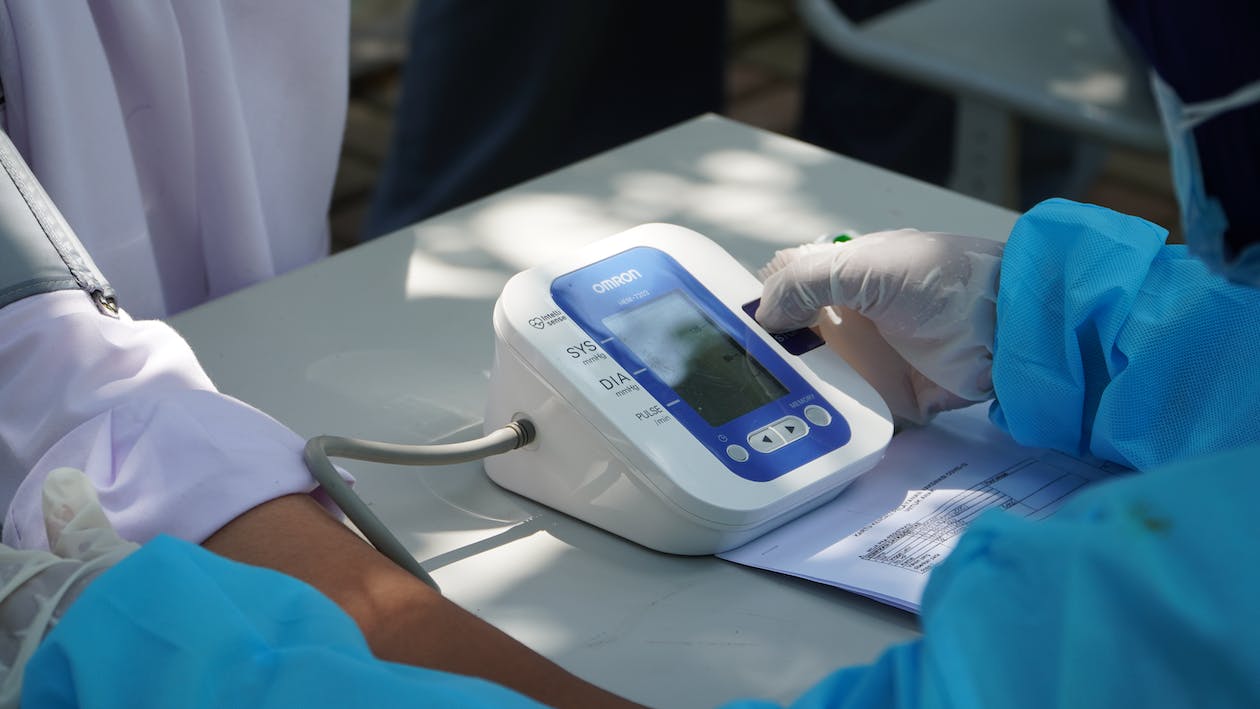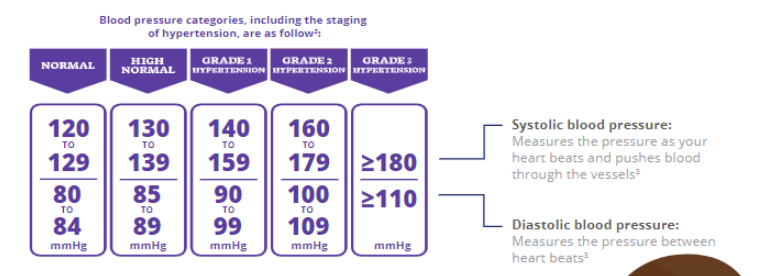
See in PDF Format: How do I know if I have Hypertension?
You may be diagnosed with hypertension after your physician sees you in at least two
visits1 and on both occasions you are found to have a blood pressure of ≥140 or ≥90
mmHg for at least 2 readings.1,2
Some people may not feel any symptom at all despite already having Hypertension. That’s because High blood pressure usually does not have any symptoms.3
IN SOME CASES, HYPERTENSION MAY PRESENT WITH3:
HYPERTENSION MAY ALSO PRESENT WITH3:
IF NOT MANAGED PROPERLY, HYPERTENSION LEADS TO THESE COMPLICATIONS:
Brain:
• A stroke occurs when a blood vessel to the brain is either blocked by a clot (ischemic stroke) or bursts (hemorrhagic stroke). When that happens, a part of the brain does not receive blood and oxygen anymore, and so it starts to die.4
• Aneurysm may develop when high blood pressure causes blood vessels to weaken and bulge5
• Dementia may develop if the narrowed or blocked arteries limit blood flow to the brain.5
Eyes:
• Vision loss or blindness due to thickened, narrowed or torn blood vessels in the eyes.5
Blood vessels:
• Peripheral artery disease (PAD) may develop from the buildup of fatty plaque (a condition known as ‘atherosclerosis’) in the arteries of the arms and legs (but more commonly in the legs).7 Hypertension plays an important role in its development, as 35–55% of patients with PAD also have hypertension.8
Heart:
• Heart attack can develop if the arteries in the heart harden and thicken5 and limit blood supply to the heart.
• Heart failure develops from the thickening of the heart’s muscle due to the increased pressure, making it difficult to pump enough blood needed by the body.5
Kidneys:
• Kidney failure can result from the damage to the blood vessels and filters in the kidney because of high blood pressure, and this may require dialysis or a kidney transplant.6
Aside from taking the medicine prescribed by your physician for your Hypertension, you can also do your part in managing it9:
References: 1. Unger T, et al. Hypertension 2020;75:1334—1357. doi: 10.1161/hypertensionaha.120.15026. 2. Sharma G; Ram CVS; Yang E. Comparison of the ACC/AHA and ESC/ESH hypertension guidelines. American College of Cardiology resource page. Available at: https://www.acc.org/latest-in cardiology/articles/2019/11/25/08/57/comparison-of-the-acc-ahaand-esc- esh-hypertension-guidelines. Accessed 5 July 2021. 3. Holland K. Everything you need to know about high blood pressure (hypertension). Healthline resource page. Available at: https://www. healthline.com/health/high-blood-pressure-hypertension?utm_medium=email&utm_source=email-share&utm_campaign=social-sharebar%E2%80%A6. Accessed 5 July 2021 4. American Heart Association (AHA). How high blood pressure can lead to stroke. AHA resource page. Available at: https://www.heart.org/en/health-topics/high-blood-pressure/healththreats-from-high- blood-pressure/how-high-blood-pressure-can-lead-to-stroke. Accessed 5 July 2021. 5. Mayo Clinic Staff. High blood pressure (hypertension). Mayo Clinic resource page. Available at: https:// www.mayoclinic.org/diseases-conditions/high-blood-pressure/symptoms-causes/syc-20373410?p=1. Accessed 5 July 2021. 6. WebMD. High blood pressure and kidney disease. WebMD resource page. Available at: https://www.webmd.com/hypertension-high-blood-pressure/guide/hypertension-related-kidney-disease#:~:text=Hypertension. Accessed 5 July 2021. 7. Centers for Disease Control and Prevention (CDC). Peripheral arterial disease (PAD). CDC resource page. Available at: https://www.cdc.gov/heartdisease/PAD.htm. Accessed 5 July 2021. 8. Bennett PC; Silverman S; Gill P. J Hum Hypertens 2009;23:213–215. 9. Mayo Clinic Staff. 10 Ways to control high blood pressure without medication. Mayo Clinic resource page. Available at: https://www. mayoclinic.org/diseases-conditions/high-blood-pressure/in-depth/high-blood-pressure/art-20046974. Accessed 5 July 2021. 10. American Heart Association (AHA) Editorial Staff. Managing high blood pressure medications. AHA resource page. Available at: https://www.heart.org/en/health-topics/high-blood-pressure/changes-you-can-make-to-managehigh-blood-pressure/ managing-high-blood-pressure-medications. Accessed 5 July 2021.
Overweight and obesity are defined as abnormal or excessive fat accumulation that presents a risk to health. A body mass […]
Around 27 million Filipino adults are overweight or obese, according to the latest National Nutrition Survey conducted by the Food […]
Advances in scientific and technological knowledge have provided unprecedented advantages in terms of immeasurable convenience in our daily living, lightning-fast […]